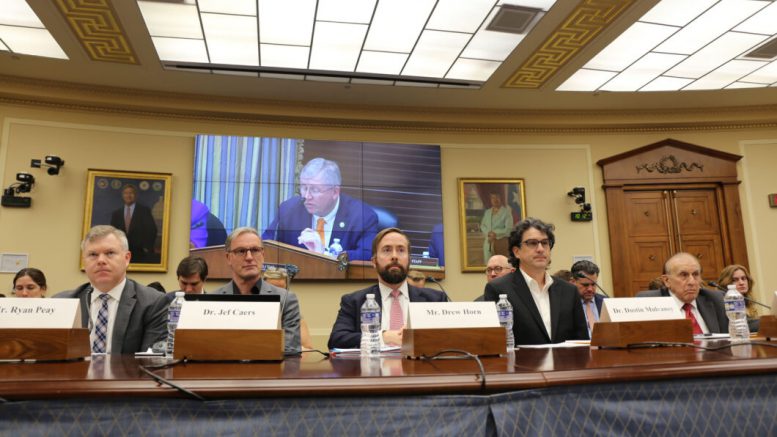U.S. critical mineral supply chains need more funding if national security needs are to be met, says GreenMet CEO Drew Horn.
Horne was one of five witnesses giving testimony during a Nov. 30 House Science, Space and Technology Committee hearing advocating for increased federal funding to plug financial holes in founding independent critical minerals supply chains, separate from China.
“In context, not all minerals or elements are equally important to our national agenda. Federal research dollars must be allocated towards those projects that achieve our economic, energy and national security needs,” Horn told The Northern Miner in an interview. He is a founder of GreenMet, which specializes in strategic consulting on critical mineral supply chains.
The push for electric vehicles and green tech has ignited a global race for critical minerals. China currently controls about 80% of the global supply chain, which is of national security concern to U.S. officials. Testimonies to the House Committee highlight the urgent need for substantial U.S. investment to establish independent, ethically sourced supply chains, balancing the extensive mining required – potentially hundreds of new mines – with environmental concerns.
Jef Caers, a Stanford University Earth & Planetary Science professor, testified to the need to invest about US$10 trillion in new mineral discoveries for batteries alone by 2050 to meet energy transition goals, contrasting with the paltry research and development in critical mineral exploration funding by government agencies.
“Funding for research and development of critical mineral exploration by government agencies is presently insignificant,” he wrote in his Nov. 30 testimony to the committee. “A secure, resilient and environmentally responsible critical mineral supply cannot be achieved in the U.S. with the current funding approach.”
In his Nov. 30 statement, Horn underlined the importance of stringent oversight to guarantee that the funds released by new legislation, including the Creating Helpful Incentives to Produce Semiconductors for America Act (CHIPS) Act and the Inflation Reduction Act (IRA), are effectively distributed throughout the entirety of the supply chain.
The committee has a say in how federal money is spent, including the US$500 billion in new spending and tax breaks contained in the IRA, and was holding hearings on the ‘role of federal research in establishing a robust U.S. supply chain of critical minerals and materials.’
Adequate oversight
Horn also touched on the impact of the IRA’s advanced manufacturing tax credits, noting the decision to include critical minerals was a “step in the right direction,” but more work remains.
“By directing applied research funds further upstream, the U.S. can continue to bolster its mining, processing, refining, and metallurgy capabilities – all the steps that lead to ‘true’ domestic manufacturing,” Horn said. “I urge the Committee to fully consider that we can develop our own superior U.S. capabilities in this sector,” he wrote in his testimony.
Horn emphasized the urgency of addressing the nation’s dependency on foreign mineral imports from the ground up. He highlights the necessity of public funding as a catalyst for innovation, driving the U.S. towards self-reliance in critical minerals.
“Good, comprehensive critical mineral policy begins with a good public-private partnership to tackle much-needed innovative research and development in the minerals resource arena,” he said.
Horn points to legislation like the CHIPS and the IRA as positive steps but underscores the need for more specific funding. “Future funding must be targeted further upstream in the critical mineral supply chain,” he explained, advocating for a more strategic approach to public investment.
Horn suggests combining public sector financing and government incentives to compete globally without compromising standards. “Public sector financing can serve as a temporary buffer,” he notes.
Horn is bullish on technological advancements in the sector. He describes cutting-edge techniques such as ‘high-tech vapour metallurgy’ and ‘AI-integrated mining practices’ that could revolutionize mineral extraction and processing with minimal environmental impact.
Moral imperative
While establishing an independent critical mineral supply chain is the goal, Horn insists that can be achieved in parallel with the U.S. maintaining the highest environmental and ethical standards in mining and processing.
Leaving exploration and mining to countries with lax environmental standards and unfair labour regulations is a global environmental justice concern, a responsibility the U.S. should not abdicate, according to Stanford professor Caers’ testimony.
Horn says achieving these standards is a matter of policy and a moral imperative.
He calls for “increased centralized oversight by the White House and at the headquarters-level of appropriate agencies to ensure effective use of public funds and adherence to high standards.” He advocates for an interagency task force under the president’s executive office for comprehensive oversight.
“The window of opportunity is fleeting, and delay increases our already severe mineral vulnerabilities. By fast-tracking the deployment of projects arising from federal research projects, we can accelerate them towards commercialization,” Horn said.


Be the first to comment on "Federal critical mineral research needs more cash, hears US House committee"